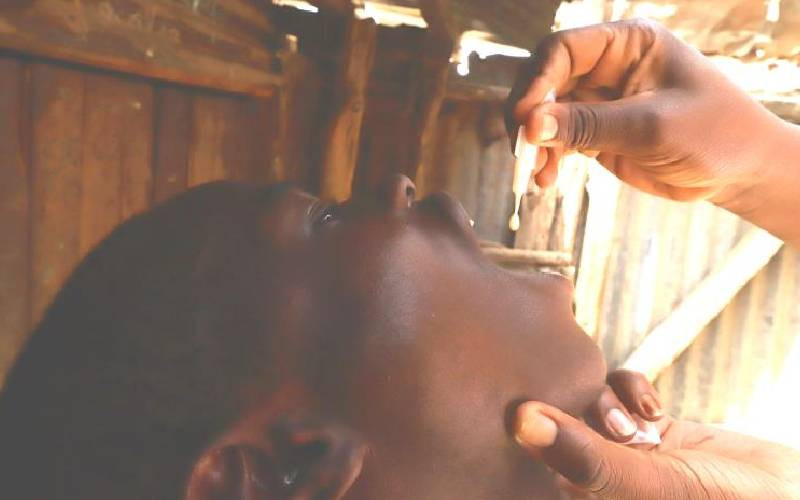
The percentage of the population that has taken the cholera vaccine in the four targeted counties of a vaccination drive has been high, according to the Ministry of Health.
The targeted campaign of Oral Cholera Vaccine, the first ever in the country, was launched last week to prevent deaths and new cases.
The campaign was launched by Health CS Susan Nakhumicha in Madogo area in Tana River, and is ongoing in the counties of Wajir, Nairobi, Tana River and Garissa Counties, including Daadab refugee camps.
The counties were identified as epicentres of the disease.
Daniel Lang'at, the head of the Department of Disease Surveillance in the Ministry of Health, said locals have embraced the vaccine.
"We are embraced that despite this being the first time to administer the cholera vaccine, the vaccination programme is going smoothly, without the hesitancy that was witnessed in other campaigns," said Dr Lang'at.
An outbreak of cholera was reported in the country in October and has since spread to 15 counties, according to a report by the Ministry.
Other counties where the disease has been reported include Mandera, Kiambu, Nakuru, Uasin Gishu, Kajiado, Murang'a, Machakos, Meru, Nyeri, Wajir, Kitui and Homabay.
The outbreak has since been controlled in the counties of Kajiado, Murang'a Nyeri and Uasin Gishu.
The country has reported more than 4,500 cumulated cases and 83 deaths.
"People in cholera-affected counties are requested to pick up the vaccine because it is efficient. We want to control a spill of the cases and stop deaths caused by the disease," Lang'at said.
The vaccine has been available in private hospitals, but it is the first time it was launched by the Ministry, and administered in public hospitals.
The vaccination targets 2.2 million people above one year.
Cholera is an acute bacterial disease which occurs as a result of consuming food that is contaminated with the bacterium Vibrio Cholerae.
The disease causes watery diarrhoea, vomiting, and dehydration which leads to death, if not treated on time.
A number of risk factors driving the disease namely outsourcing of food vendors with questionable hygiene standards, congestion in the refugee camps and sourcing of water from contaminated sources due to the prolonged drought.
Other factors as per experts include poor sanitation in informal urban settlements and the sprouting of unregulated water vendors.
During the launch of the vaccine, Ms Nakhumicha directed counties to heighten surveillance in all public and private health facilities at the community level.
She also asked counties to provide cholera supplies to assist in management of patients, provision of cholera supplies to assist in the management of patients, and provision of water and sanitation supplies to help in the purification of water sources and household water treatment.
To help trace cases on time, the ministry issued a cholera emergency alert to all counties to heighten surveillance for all diarrhoea, including cholera.
Additionally, healthcare workers were reminded of the importance of early detection, confirmation and management of suspected cases of cholera, to minimise morbidity and mortality arising from the disease.
On his part, Prof Omu Anzala, a virologist in the department of medical microbiology, College of Health Sciences, University of Nairobi said there is need to scale up the vaccine, to prevent a spill.
"We need more sensitisation of the vaccine to ensure eligible population picks it," said Anzala.
He said in the past, vaccines have received hesitancy because the larger population believe vaccines are only meant for children.
 The Standard Group Plc is a multi-media organization with investments in media
platforms spanning newspaper print
operations, television, radio broadcasting, digital and online services. The
Standard Group is recognized as a
leading multi-media house in Kenya with a key influence in matters of national
and international interest.
The Standard Group Plc is a multi-media organization with investments in media
platforms spanning newspaper print
operations, television, radio broadcasting, digital and online services. The
Standard Group is recognized as a
leading multi-media house in Kenya with a key influence in matters of national
and international interest.











